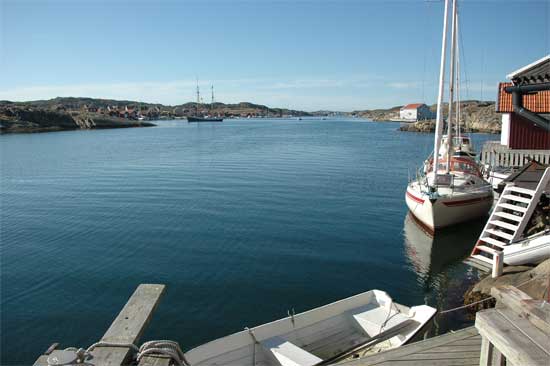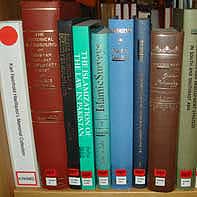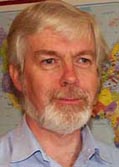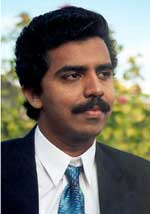SWEDISH
SOUTH ASIAN STUDIES NETWORK
Newsletter 75:
 20
June 2007
20
June 2007
| Educational News |
| Conferences and workshops |
| South Asia related Culture |
| New and updated information |
•
Change of Directorship
Professor
Staffan Lindberg, who was the driving force behind the creation of
the Swedish South Asian Studies Network in the year 2000 and has been
its Director since the formal launch of SASNET in 2001, now retires
from his position as SASNET Director. From
1 July 2007, he is succeeded by the
historian Anna Lindberg, currently Assistant Professor at Penn
State University in USA. She has been appointed Director/Coordinator
for SASNET on a 50 % basis till 31 December 2009.
She will be affiliated with Lund University’s Centre
for East and South-East Asian Studies. More
information.
• 20
applications for 2007 SASNET grants
 20 applications were received for the
2007 round of SASNET Planning Grants. Last date for applications was
15 June 2007. Out
of the 20 applications, 11 refer to networking for new research programmes/projects,
and three to networking for new educational projects. Another four
applications refer to Interdisciplinary Workshop Grants (for organising
a South Asia related research workshop in Sweden or in South Asia);
and finally two applications refer to the Guest Lecture Programme (for
inviting a guest lecturer from South Asia, to give lectures at more
than one Swedish university). The applications will then be screened
by a reference group consisting of three eminent Nordic South Asia
scholars, and final decisions be taken by the SASNET board on its next
meeting Tuesday 28 August 2007. Total amount to distribute will be
SEK 885 000. Decisions will be taken on 28 August 2007. More
information.
20 applications were received for the
2007 round of SASNET Planning Grants. Last date for applications was
15 June 2007. Out
of the 20 applications, 11 refer to networking for new research programmes/projects,
and three to networking for new educational projects. Another four
applications refer to Interdisciplinary Workshop Grants (for organising
a South Asia related research workshop in Sweden or in South Asia);
and finally two applications refer to the Guest Lecture Programme (for
inviting a guest lecturer from South Asia, to give lectures at more
than one Swedish university). The applications will then be screened
by a reference group consisting of three eminent Nordic South Asia
scholars, and final decisions be taken by the SASNET board on its next
meeting Tuesday 28 August 2007. Total amount to distribute will be
SEK 885 000. Decisions will be taken on 28 August 2007. More
information.
• New
Counsellor for Science and Technology in New Delhi visited SASNET
 Dr.
Stefan Jonsson from the Swedish
Institute for Growth Policy Studies
(ITPS) visited SASNET’s
root node office in Lund on Tuesday 19 June 2007. From the middle of
August 2007, Stefan Jonsson (photo to the right),
will be based at the Swedish Embassy in New Delhi, working as Counsellor
for Science and Technology. He has a background in Economics from the Centre
for Research on Innovation and Industrial Dynamics (CIND), Uppsala
University and most recently at Stockholm
School of Economics. In the early 1990s he was working for some
years with the Swedish Sida supported Social Forestry project carried
out in the Indian state of Orissa. His mission for ITPS consists to
a large extent in establishing contacts within the fields of research
and science, and that was the reason for his visit to Lund to meet
SASNET’s Director, Prof. Staffan Lindberg, and its Deputy Director
Lars Eklund. While in Lund he also met Prof. Rajni Hatti-Kaul at the
Dept. of Biotechnology, involved in several
research projects connected to India. More
information.
Dr.
Stefan Jonsson from the Swedish
Institute for Growth Policy Studies
(ITPS) visited SASNET’s
root node office in Lund on Tuesday 19 June 2007. From the middle of
August 2007, Stefan Jonsson (photo to the right),
will be based at the Swedish Embassy in New Delhi, working as Counsellor
for Science and Technology. He has a background in Economics from the Centre
for Research on Innovation and Industrial Dynamics (CIND), Uppsala
University and most recently at Stockholm
School of Economics. In the early 1990s he was working for some
years with the Swedish Sida supported Social Forestry project carried
out in the Indian state of Orissa. His mission for ITPS consists to
a large extent in establishing contacts within the fields of research
and science, and that was the reason for his visit to Lund to meet
SASNET’s Director, Prof. Staffan Lindberg, and its Deputy Director
Lars Eklund. While in Lund he also met Prof. Rajni Hatti-Kaul at the
Dept. of Biotechnology, involved in several
research projects connected to India. More
information.
• Crafoord
funds to digitalise Karl Reinhold Haellquist’s collection
 In 2004 a
unique collection of more than 6000 South Asia related books, journals,
videotapes and pamphlets on various aspects of South Asian studies
was donated to SASNET/Lund University. The
material comes from the private library of the renowned Swedish scholar
Karl Reinhold Haellquist who passed away in 2000, and were later donated
by his wife Inger Sondén-Haellquist.
Karl Reinhold was a historian specialised on South Asia, and worked
for many years at the Nordic Institute of Asian Studies (NIAS) in Copenhagen.
The donated books were supposed to form a Memorial Collection at Lund
University’s Asian Library (more information),
but due to lack of funding this has not materialised so far. For now,
only a very small part of the collection is available for reference
in the Asia Library. However, in June 2007 the Crafoord Foundation
decided to give SEK 120 000 as a grant to SASNET in order to digitalize
Karl Reinhold Haellquist’s private archive – part of the
collection. New efforts are now being made to find means to catalogue
and find storage for the entire unique collection of books.
In 2004 a
unique collection of more than 6000 South Asia related books, journals,
videotapes and pamphlets on various aspects of South Asian studies
was donated to SASNET/Lund University. The
material comes from the private library of the renowned Swedish scholar
Karl Reinhold Haellquist who passed away in 2000, and were later donated
by his wife Inger Sondén-Haellquist.
Karl Reinhold was a historian specialised on South Asia, and worked
for many years at the Nordic Institute of Asian Studies (NIAS) in Copenhagen.
The donated books were supposed to form a Memorial Collection at Lund
University’s Asian Library (more information),
but due to lack of funding this has not materialised so far. For now,
only a very small part of the collection is available for reference
in the Asia Library. However, in June 2007 the Crafoord Foundation
decided to give SEK 120 000 as a grant to SASNET in order to digitalize
Karl Reinhold Haellquist’s private archive – part of the
collection. New efforts are now being made to find means to catalogue
and find storage for the entire unique collection of books.
• More information about SASNET and its
activities
See SASNET’s page, http://www.sasnet.lu.se/sasnet.html
• VINNOVA funds Indo-Swedish E-health
project with SEK 1 million
![]() After
the Indo-Swedish MoU on science and technology, signed in December 2005,
the Swedish Governmental Agency for Innovation Systems, VINNOVA,
has been given the task to develop applied research projects in biotechnology
and ICT-technology (especially E-health and E-governance)
with participation of both Indian and Swedish researchers and private
companies. In April 2007, VINNOVA therefore gave SEK 1 million as a
grant to the Swedish Institute of Computer Science
AB,
SICS, for a project on Indo-Swedish research collaboration within the
field of E-health. The project is led by the Managing Director of SICS,
Dr. Staffan Truvé, with a background from Chalmers Institute
of Technology and the School of Business, Economics and Law, Göteborg
University. He has also for many years worked for different IT and
research enterprises, and established the Interactive Institute and
the Victoria Institute, institutions closely associated to SICS.
After
the Indo-Swedish MoU on science and technology, signed in December 2005,
the Swedish Governmental Agency for Innovation Systems, VINNOVA,
has been given the task to develop applied research projects in biotechnology
and ICT-technology (especially E-health and E-governance)
with participation of both Indian and Swedish researchers and private
companies. In April 2007, VINNOVA therefore gave SEK 1 million as a
grant to the Swedish Institute of Computer Science
AB,
SICS, for a project on Indo-Swedish research collaboration within the
field of E-health. The project is led by the Managing Director of SICS,
Dr. Staffan Truvé, with a background from Chalmers Institute
of Technology and the School of Business, Economics and Law, Göteborg
University. He has also for many years worked for different IT and
research enterprises, and established the Interactive Institute and
the Victoria Institute, institutions closely associated to SICS.
A
high-level delegation from the Dept. of Biotechnology, Ministry of
Science and Technology, Government of India, visited Sweden 6–9
June 2007. The visit was carried out within the framework
of the 2005 MoU on science and technology. The Indian
delegation, led by Dr. Bhan, first visited the departments of Biotechnology,
Molecular Biology, WoodBio and Environmental Microbiology at the Royal
Institute of Technology (KTH). They also visited Karolinska Institutet – hosted
by Dr. Sanjeevi Carani – and Uppsala University’s Biomedical
Centre. At a meeting organised by VINNOVA in Stockholm, they also met
representatives from Chalmers Institute of Technology and Göteborg
University.
In the third week of June, another Indian high-level government delegation
visited Sweden just a week after the Biotechnology department delegation.
This time representatives from the Dept. of IT within the Ministry of Communications
and Information Technology, headed by its Director, Mr. K.K. Ghosh, visited
institutions in Stockholm, Göteborg
and Linköping focused on E-health. The visit was planned for by
VINNOVA.
• Professionalization of Primary-School
Teachers in Bangladesh theme for Bergen dissertation
S. M. Abdul
Quddus, Dept. of Administration and Organization Theory, University
of Bergen, will defend his doctoral dissertation titled ”The
Unfeasibility of Professionalization of Primary-School Teachers in
Bangladesh. An Analysis of the actors and factors, 1971-2001”,
on Friday 22 June 2007, 10.15. Venue: Auditorium, Ulrike Pihls hus,
Professor Keysers gate 1, Bergen. Faculty opponent is Professor Geoffrey
Wood, Faculty of Humanities and Social Sciences, University of Bath,
England. More
information.
• Nordic Summer University may opt for a South Asian
Studies programme
![]() ”South
Asia and the challenges of the 21st Century” is the theme for
a proposed new Nordic Summer University (NSU) programme. A
cluster of Nordic researchers in South Asian studies, comprising Peter
B Andersen, University of Copenhagen; Hans Blomkvist, University of
Uppsala; Michael W Hansen, Copenhagen Business School; Sidsel Hansson
and Catarina Kinnvall, Lund University; and Pamela Price, University
of Oslo, has prepared the proposal which includes three winter sessions
(2008-2010) and smaller thematic workshops at the yearly NSU summer
sessions. The aim is to connect presently dispersed scholars on South
Asian studies and upgrade the existing mass of Nordic PhD students
and younger researchers ia the Nordic Summer University activities.
For more than 50 years NSU has been known to develop academic and intellectual
debates that has involved several leading intellectuals, politicians,
and scholars of the Nordic countries. The organization is sponsored
by the Nordic Council of Ministers. A decision whether ”South
Asia and the challenges of the 21st Century” (which is a development
of a joint Nordic research school on Asia established in 2005 by NIAS
in Copenhagen – more information)
will be accepted as a NSU programme will be taken in August 2007. More
information about the proposal.
”South
Asia and the challenges of the 21st Century” is the theme for
a proposed new Nordic Summer University (NSU) programme. A
cluster of Nordic researchers in South Asian studies, comprising Peter
B Andersen, University of Copenhagen; Hans Blomkvist, University of
Uppsala; Michael W Hansen, Copenhagen Business School; Sidsel Hansson
and Catarina Kinnvall, Lund University; and Pamela Price, University
of Oslo, has prepared the proposal which includes three winter sessions
(2008-2010) and smaller thematic workshops at the yearly NSU summer
sessions. The aim is to connect presently dispersed scholars on South
Asian studies and upgrade the existing mass of Nordic PhD students
and younger researchers ia the Nordic Summer University activities.
For more than 50 years NSU has been known to develop academic and intellectual
debates that has involved several leading intellectuals, politicians,
and scholars of the Nordic countries. The organization is sponsored
by the Nordic Council of Ministers. A decision whether ”South
Asia and the challenges of the 21st Century” (which is a development
of a joint Nordic research school on Asia established in 2005 by NIAS
in Copenhagen – more information)
will be accepted as a NSU programme will be taken in August 2007. More
information about the proposal.
• First funding from the Facility to Wastewater Treatment
Project in Tiruppur
 An
Indo-Swedish so-called Facility for Environmental Initiatives and Innovations
(”the Facility”)
was set up by Sida, the Swedish International Development Cooperation
Agency, in December 2006. The aim is to encourage knowledge
sharing and co-operation on development of new technical solutions
between India and Sweden, and to evolve best practices in the environmental
field. The Facility offers funds to apply for, and is open to Swedish
and Indian public institutions, the private sector, civil society and
research and academic institutions. On the Swedish side it is administered
by an officer at the Swedish Embassy in New Delhi. From 2007 the Facility
will be fully operational. More
information, including guidelines and full background material.
The first Swedish researcher to receive funding from the Facility
for Environmental Initiatives and Innovations is Prof. Bo Mattiasson
(photo to the right), Dept.
of Biotechnology, Lund University. Prof. Mattiasson leads
a major applied research project on biodegradable methods to
treat the waste water emanating from the textile industries
in the South Indian city of Tiruppur. The project, titled ”Development
of Process Technology for Treatment of Wastewaters from Greeting
Knit Wear in Tirupur, India”, was given SEK 600
000 as a grant from the Facility. More
information (as a pdf-file)
An
Indo-Swedish so-called Facility for Environmental Initiatives and Innovations
(”the Facility”)
was set up by Sida, the Swedish International Development Cooperation
Agency, in December 2006. The aim is to encourage knowledge
sharing and co-operation on development of new technical solutions
between India and Sweden, and to evolve best practices in the environmental
field. The Facility offers funds to apply for, and is open to Swedish
and Indian public institutions, the private sector, civil society and
research and academic institutions. On the Swedish side it is administered
by an officer at the Swedish Embassy in New Delhi. From 2007 the Facility
will be fully operational. More
information, including guidelines and full background material.
The first Swedish researcher to receive funding from the Facility
for Environmental Initiatives and Innovations is Prof. Bo Mattiasson
(photo to the right), Dept.
of Biotechnology, Lund University. Prof. Mattiasson leads
a major applied research project on biodegradable methods to
treat the waste water emanating from the textile industries
in the South Indian city of Tiruppur. The project, titled ”Development
of Process Technology for Treatment of Wastewaters from Greeting
Knit Wear in Tirupur, India”, was given SEK 600
000 as a grant from the Facility. More
information (as a pdf-file)
• Prakash Nelliyat defended his thesis at the University
of Madras
 •
Dr Prakash Nelliyat, environmental economist from Madras School of Economics
in Chennai, India, has a long-standing relation to the Dept.
of Water and Environmental Studies, Linköping University.
On 22 November 2006, Prakash defended his doctoral dissertation titled ”Industrial
Growth and Environmental Degradation. A Case Study of Industrial
Pollution in Tiruppur”
at the University of Madras. The thesis deals with the rapid economic
growth achieved after globalization, and how it has adversely affected
the quality of the environment, imposed considerable social costs and
livelihood impacts and has become a major threat to sustainable development.
Even the industries in Tiruppur themselves have been affected by pollution.
The thesis concludes with recommendations of certain policies to achieve
an environmentally sustainable industrial development of Tiruppur. More
information.
•
Dr Prakash Nelliyat, environmental economist from Madras School of Economics
in Chennai, India, has a long-standing relation to the Dept.
of Water and Environmental Studies, Linköping University.
On 22 November 2006, Prakash defended his doctoral dissertation titled ”Industrial
Growth and Environmental Degradation. A Case Study of Industrial
Pollution in Tiruppur”
at the University of Madras. The thesis deals with the rapid economic
growth achieved after globalization, and how it has adversely affected
the quality of the environment, imposed considerable social costs and
livelihood impacts and has become a major threat to sustainable development.
Even the industries in Tiruppur themselves have been affected by pollution.
The thesis concludes with recommendations of certain policies to achieve
an environmentally sustainable industrial development of Tiruppur. More
information.
• Danish Government launched its Asia
Strategy
The
Danish Government launched its Asia Strategy (”Danmark i Asien – en
prioritering af fremtiden”) on Friday 15 June 2007. The
strategy sets out the Government’s priorities when it comes to
tackle the opportunities and challenges in Asia. It is similar to the
Swedish government’s 1998 report
”Our Future with Asia – A Swedish Asia Strategy for 2000
and beyond”, that among other things also paved the way for
the creation of SASNET (more
information about the Swedish report).
• Evaluation team commended the activities
of NIAS
![]() In
December 2006, an international evaluation team concluded that the
Nordic Institute of Asian Studies in Copenhagen provides and communicates
accomplished research on Asia. According to the evaluation,
NIAS research is timely in addressing issues of great international
concern. In addition, NIAS successfully supports students and scholars
in the Nordic region and NIAS researchers act as expert advisors to
Nordic governments and firms and as commentators and disseminators
in the mass media as well. The fact that NIAS in reality puts very
little effort to South Asia related research is mentioned only in passing – with
a formulation that ”in other institutions, some Asia-area
specialists feel that their specific countries are not adequately emphasized
by NIAS, forcing them to compensate by devoting resources to their
own activities, such as the South Asian Network organized at Lund”. Read
the full evaluation report.
In
December 2006, an international evaluation team concluded that the
Nordic Institute of Asian Studies in Copenhagen provides and communicates
accomplished research on Asia. According to the evaluation,
NIAS research is timely in addressing issues of great international
concern. In addition, NIAS successfully supports students and scholars
in the Nordic region and NIAS researchers act as expert advisors to
Nordic governments and firms and as commentators and disseminators
in the mass media as well. The fact that NIAS in reality puts very
little effort to South Asia related research is mentioned only in passing – with
a formulation that ”in other institutions, some Asia-area
specialists feel that their specific countries are not adequately emphasized
by NIAS, forcing them to compensate by devoting resources to their
own activities, such as the South Asian Network organized at Lund”. Read
the full evaluation report.
• Contributors wanted for volume on
Communalism and Globalisation in South Asia
Dr. Deana
Heath at the Dept. of History, School of Histories and Humanities,
Trinity College, Dublin, Ireland, is seeking contributors for an edited
volume on Communalism and Globalisation in South Asia. The
book is the product of a year-long seminar series held at Trinity College
Dublin in 2005-06 and contributors include some of the most prominent
scholars in the field working on issues pertaining to communalism in
India and Pakistan and among the Indian and Pakistani diasporas. In
an effort to broaden the geographical scope of the volume we are seeking
additional contributions from scholars who work on Sri Lanka and Bangladesh.
Scholars who work on other parts of South Asia, and whose work engages
with the relationship between communalism and globalisation, are however
also welcome to contribute with material. Please contact Dr. Deana
Heath.
• Roskilde University
offers short-term scholarships for Ph.D.
students
The Graduate
Researcher School of International Development Studies at Roskilde
University, Denmark announces a limited number of short-term scholarships intended
for Ph.D. students already engaged in a formal Ph.D. study programme,
but who would be interested in pursuing part of their programme with
IDS, Roskilde. A certain preference will be given to students from
the developing world.
A limited number of guest scholarships are available for Ph.D. students for a
period ranging from 3 to 5 months. The scholarships are in the amount of DKK
10.000 per month and should cover basic living expenses. Travel to and from Denmark
will have to be borne by the students themselves. IDS, Roskilde will to the extent
possible assist students in finding accommodation, assist with visa requirements,
etc.
The scholarships are available starting February 2008 or soonest thereafter.
Applications in triplicate should be received no later than September 10th, 2007,
with a brief research proposal/project (max 5 pages), a CV and recommendations
from your supervisor enclosed. Also specify the intended duration of your stay
(3-5 months). Further information about the scholarships can be obtained by contacting
the Secretary of the School, Ms. Inge Jensen,
or the Director of the Graduate School, Professor Christian
Lund.
• More information about South Asia related
research at Swedish and Nordic universities
See SASNET’s page, http://www.sasnet.lu.se/research.html
• No
French faculty has joined new technical university in Pakistan
 Pakistan's
ambitious US$4.3 billion project to create nine Pakistani-European
engineering universities with 50 per cent of the faculty and administrators
from Europe (the
KTH university in Sialkot being one of them, more
information) is an example of how not to proceed, according to
Prof. Pervez Hoodbhoy. In an article titled ”World-class
universities: a new holy grail”, published by SciDev.Net
on 6 June 2007, Prof, Hoodbhoy says that the official opening of the
first of these universities, in collaboration with a French consortium,
is scheduled for October this year. But the situation on the ground
is dismal. Because of Pakistan's dangerous security situation, the
French are absent from the university – as of March 2007 not
a single French faculty member had joined. But even if the Europeans
come, there are not enough Pakistani staff to teach at these universities.
And given the crisis in science education in Pakistan, there are simply
not enough well-prepared students to take advantage of the high-level
university instruction. Read
the full article.
Pakistan's
ambitious US$4.3 billion project to create nine Pakistani-European
engineering universities with 50 per cent of the faculty and administrators
from Europe (the
KTH university in Sialkot being one of them, more
information) is an example of how not to proceed, according to
Prof. Pervez Hoodbhoy. In an article titled ”World-class
universities: a new holy grail”, published by SciDev.Net
on 6 June 2007, Prof, Hoodbhoy says that the official opening of the
first of these universities, in collaboration with a French consortium,
is scheduled for October this year. But the situation on the ground
is dismal. Because of Pakistan's dangerous security situation, the
French are absent from the university – as of March 2007 not
a single French faculty member had joined. But even if the Europeans
come, there are not enough Pakistani staff to teach at these universities.
And given the crisis in science education in Pakistan, there are simply
not enough well-prepared students to take advantage of the high-level
university instruction. Read
the full article.
• Higher education,
lowest standards in India
In an article
by Shubhajit Roy in the Sunday Express (Mumbai) 10 June 2007, a recent Indian
University Grants Commission survey is referred to with a startling
admission: Over half of the students who pass Class XII don’t
even enter the higher-education sector; 90 per cent of Indian colleges
and 68 per cent of universities across the country are of middling
or poor quality. On almost all indicators, from faculty standards
to library facilities, from computer availability to student-teacher
ratio, higher education is in crying need for an upgrade. Read
the full article.
• More information about South
Asia related education at Swedish and Nordic universities
See SASNET’s page, http://www.sasnet.lu.se/education.html
• Volume on Ethnographic
Discourse to be published after Hyderabad conference
An International
conference titled ”Ethnographic
Discourse of the Other in Contemporary Indian Society” has been
organised by the University of Hyderabad in India 18–20
June 2007. After the conference a volume on the same theme will be
produced, focusing on contemporary debates on the marginal groups in
India, on the umbrella terms like: Sudra, Dalit, Subaltern, OBC and
Minority. Scholars of subaltern society are invited to submit papers,
with a submission deadline set to 20 July 2007. More information to
be received from Eswarappa Kasi,
Dept. of Anthropology, University of Hyderabad.
• Development as Justice theme for the
2007 Oxford University Students for Development conference
The 2007
Oxford University Students for Development conference will be held
on 23 June 2007. This annual one-day conference,
organised since 2002 by graduate students at Oxford's Department
for International Development (Queen Elizabeth House), has an aim
to bring together students from the United Kingdom and beyond to stimulate
fresh and novel thinking in the field of development. The theme for
the 2007 conference will be 'Development as Justice'. It is open for
students, practitioners, and anyone concerned by global inequality
and injustice.
• Golden Jubilee Sociology conference
in Dhaka
An International seminar on ”Fifty Years of Sociology,
Fifty Years of Social Transformation: Future of the Past” is
held in Dhaka, Bangladesh, 28–30 June 2007. It is organised
by the Dept. of Sociology at the University of Dhaka, in cinnection
with its Golden Jubilee celebrations. Papers are invited from interested
participants on growth and development of sociology as a discipline
and its role in social transformation covering for example: ”Crisis
and Future of Sociological Theory”; ”Media and Post Modern/Post
Colonial Society”; ”Globalization, Identity and Risk”; ”Social
Inequality, Social Mobility and Class Formation”;
”Poverty, Microcredit, and Rural Transformation”; ”Population,
Health, Gender and Reproductive Rights”; and ”Urban Development,
Urban Space and Asian Megalopolis”. Venue: Teacher-Student Centre
(TSC), University of Dhaka. Limited travel assistance may be provided
to South Asian participants. Selected papers will be published in a special
issue of the Bangladesh e-Journal of Sociology. More
information (as a pdf-file).
• Leicester conference on Refugees and
the End of Empire
A conference titled ”Refugees
and the End of Empire” is
organised by De Montfort University in Leicester, UK, 29–30 June
2007. It is organised by in Leicester. The purpose of the
conference is to examine the relationship between imperial collapse,
the emergence of successor nationalism, the exclusion of ethnic groups
with the wrong credentials, and the refugee experience. The conference
organizers welcome proposals which look at these themes in all of the
major cases of twentieth century imperial collapse. Themes of particular
interest include: the role of empire in creating distinct ethnic populations;
the emergence of exclusivist nationalist ideologies and their views
of minorities; the attitude and role of successor states in the creation
of refugees; and the refugee experience.
• New Delhi workshop on India’s
Democratic Renewal
An International
workshop on ”India’s
Democratic Renewal in Question” is held in New Delhi, India,
9–10 July 2007. It is organised by Centre de Sciences
Humaines (CSH), and is coordinated by Dr. Stéphanie Tawa Lama-Rewal.
Session 1 will deal with ”State Assemblies: The Political Representation
of Identities and Interests” and be chaired by Dr. Mujibur Rehman,
Jamia Millia Islamia, Delhi. Session 2 deals with ”State Assemblies:
Identity politics, Violence and Normalisation”
and will be chaired by Dr. Pralay Kanungo, Jawaharlal Nehru University.
Session 3 deals with ”Decentralization and Democracy in Chattisgarh” and
will be chaired by Dr. Girish Kumar, Indian Institute of Political
Administration, Delhi. The final session, No. 4 deals with ”Participation
versus representation in local, urban democracy” and will
be chaired by Dr. Véronique Dupont, Centre de Sciences Humaines,
Delhi. Venue: Habitat Centre, Willow Hall. More
information.
• Pune conference on Youth and Democracy
in South Asia
Celebrating 60 years of India’s
Independence, an International Conference on Youth and Democracy in
South Asia will be held in Pune, India, 12–15 August 2007.
The Conference, organised by the Centre for Youth Development & Activities
(CYDA) will aim at discussing on various dimensions that youth can
and must play not only on issues that concern them but also in the
formulations of policies that affect them. Youth from South Asian countries
as well as a few Asia Pacific regions will be invited to participate
in the conference. Venue: YMCA, Quarter Gate, Pune.
• Peshawar conference on the War of
Independence in 1857
The Department
of History at the University of Peshawar organises an International
Conference on the War of Independence in 1857, 18–19 August 2007.
It will be held in the university’s
Bara Gali Summer Campus, located on Abbottabad-Nathia Gali/Murree road
at a distance of 30 kilometers from Abbottabad at an altitude of around
7700 feet above sea level (it was basically a British army camp handed
over to the University of Peshawar by the then President of Pakistan,
Muhammad Ayub Khan). The conference will be carried out in collaboration
with the Pakistani Higher Education Commission (HEC), and forms one
part of Pakistan’s ambitions to celebrate 150 years of the War
of Independence, 1857 in a befitting manner. For more information,
please contact more information, please contact Dr. Syed
Minhaj ul Hassan, Professor & Chairman, Department of History,
University of Peshawar.
• Fourth International workshop
on Tamil Epigraphy in Paris
The fourth International workshop
on Tamil Epigraphy will be held 17–28 September 2007 at Ecole
Pratique des Hautes Etudes, Section des Sciences historiques
et philologiques, Paris, France. This special program, part of the
regular seminar, is organised as requested by many researchers on humanities
working on Tamil in different countries. There are no registration
fees and the course is offered freely. Classes will be held from Monday
till Friday, morning 9.30 a.m. to 12.30 p.m. (lunch break) afternoon
14.00 to 16.30 p.m.The participants have to arrange themselves their
travel to Paris and accommodations. Deadline for registration is 1
September 2007. More information (as
a pdf-file).
• Roskilde PhD Workshop on Post-Exotic
India A New Narrative in Making?
The Graduate School of International
Development Studies, Roskilde University organises a two-days Intensive
PhD Workshop titled ”Post-Exotic India A New Narrative in Making?” in
collaboration with SASNET on 26-27 September 2007 in Roskilde, Denmark.
The seminar is prepared by Dr. Ravinder Kaur and Prof. Laurids Lauridsen
from RUC and Prof. Staffan Lindberg, Lund University. The workshop
aims to posit and explore the post-exotic India through the following
themes:
• processes and effects of 1991 economic liberalisation, • emergence
of a vocal, mobile and astute middle class, • global ambitions
of India, and • its regional implications in South Asia. The
first day of the workshop will be open to all, whereas the second
part of the workshop is open only to PhD students upon application
by July 15th to rkaur@ruc.dk.
A maximum of 20 PhD students can participate in the work shop sessions.
Each participant must prepare a short paper (no more than five
pages), presenting her/his research design and setting, main questions
regarding fieldwork and data collection techniques.
• Islamabad conference on India-Pakistan
Relations: Prospects and Challenges
An International
seminar on ”India-Pakistan
Relations: Prospects and Challenges” will be held in Islamabad,
Pakistan, 1–2 December 2007. The seminar, organised
by Dr. Sohail Mahmood at Preston University in Islamabad, aims to analyze
the significant issue pertaining to peace building in South Asia, with
particular reference to the ongoing peace dialogue between India and
Pakistan. More information (as a pdf-file).
• Oslo workshop on Approaching
Elections in South Asia
A workshop in on ”Approaching
Elections in South Asia: Performances, Principles and Perceptions” will
be held in Oslo, Norway 6–8 December 2007. The workshop
is organised by Prof. Pamela G. Price and Prof. Arild Engelsen Ruud,
University of Oslo, and comes under the aegis of the ”Political
Culture in South Asia” research project, currently undertaken
at the university’s Faculty of Humanities. Papers are invited
that will discuss elections in South Asia from a variety of qualitative
viewpoints. The aim is to investigate meanings of the act of voting
and explorations of the wider symbolic and material worlds of elections.
Depending on the size of the workshop, funding for travel and/or room
and board are available upon application.
• Identities: Reflections on Global Gujarati
Communities theme for Toronto conference
 The
Gujarat Studies Association will be holding its 2nd Biennial Conference
on 23-24 May 2008 at the University of Toronto, Canada.
The theme for the conference is "Identities: Reflections on Global
Gujarati Communities". It will be organised in collaboration
with the University of Toronto and its New College, the Historical
Studies Department at University of Toronto Mississauga, the Centre
for South Asian Studies, the Religion in the Public Sphere Initiative
and the Nirman Foundation. Ali Asani, Kenya born Professor of the Practice
of Indo-Muslim Languages and Culture at Harvard University, USA, will
be one of the key speakers, along with Professor Radhika Desai from
University of Manitoba; and Jason Kenney, Secretary of State, Multiculturalism
and Canadian Identity. Abstract submission deadline is 16 September
2007. More
information.
The
Gujarat Studies Association will be holding its 2nd Biennial Conference
on 23-24 May 2008 at the University of Toronto, Canada.
The theme for the conference is "Identities: Reflections on Global
Gujarati Communities". It will be organised in collaboration
with the University of Toronto and its New College, the Historical
Studies Department at University of Toronto Mississauga, the Centre
for South Asian Studies, the Religion in the Public Sphere Initiative
and the Nirman Foundation. Ali Asani, Kenya born Professor of the Practice
of Indo-Muslim Languages and Culture at Harvard University, USA, will
be one of the key speakers, along with Professor Radhika Desai from
University of Manitoba; and Jason Kenney, Secretary of State, Multiculturalism
and Canadian Identity. Abstract submission deadline is 16 September
2007. More
information.
• Paper proposals invited for Anthropological
and Ethnological Sciences conference in Kunming
The 16th
International Union of Anthropological and Ethnological Sciences (IUAES)
will be held 15–23
July 2008 in Kunming, Yunnan, China. The conference has the
overall theme ”Humanity, Development and Cultural Diversity” and
includes a panel entitled
”Diverse Ethnic Rites of Passage”. This panel,
convened by Associate Professor Zulfiquar
Ali Islam, Dept. of Sociology, University of Rajshahi, Bangladesh,
and Associate Professor Md Mustafa Kamal Akand from the Dept. of
Anthropology at the same university, tries to pinpoint the diversities
of the ethnic communities inhabited in close proximity to different
geographic environment to dramatize various rituals for recognizing
their social status assigned to every stages of life. Dr. Zulfiquar
Ali Islam also convenes a second panel (together with Prof. A H M
Zehadul Karim, Dept. of Anthropology, University of Rajshahi), titled ”Indigenous
Knowledge for Ecological Resource Management”. This session
invites proposals from the academicians of different disciplines,
and also people from different regions of the globe, to have the
diversities in ecological resource management initiatives. More
information about the IUAES conference.
• Other conferences connected to South Asian
studies arranged all over the World
See SASNET’s page, http://www.sasnet.lu.se/conferences.html#conf
Important lectures and workshops
• Equity in Rural Development theme
for the 2007 Lund University Development Research Day
The
2007 Lund University Development Research Day (Utvecklingsforskningens
Dag) will be held on Monday 17 September 2007. The theme for
the day will be ”Equity in Rural Development”,
and the arrangement is jointly hosted by Lund University’s Dept.
of Economics and Dept. of Economic History.
The programme includes short lectures in parallel sessions, by researchers
and students presenting Minor Field Studies, many of them related to
South Asia. More information (as a pdf-file).
• Sudipta Kaviraj keynote speaker at 2007
SALT Thematic days in
Uppsala
 The
Forum for Advanced Studies in Arts, Languages and Theology (SALT) at
Uppsala University arranges its yearly event, SALT Thematic days, on
4–5 October 2007. The theme for the 2007 event is ”Crossing
Disciplinary Boundaries”, and focus on the question of working
across and between disciplines, both from a theoretical perspective
(What do we actually mean by interdisciplinarity?) and a practical
perspective (How can it best be achieved?). Two renowned scholars,
Prof. Paisley Livingston and Prof. Sudipta Kaviraj, will initiate the
discussions on 4 October to be followed by a panel discussion on 5
October. The thematic days will conclude with a panel of ‘decision-makers’ in
research funding to be challenged by young researchers and doctoral
students. Prof. Kaviraj, professor of South Asian Politics in the Dept.
of Middle East and Asian Languages and Cultures at Columbia University
in New York, USA, will also hold one of the keynote lectures at the
2007 SALT Thematic days. More
information with full programme.
The
Forum for Advanced Studies in Arts, Languages and Theology (SALT) at
Uppsala University arranges its yearly event, SALT Thematic days, on
4–5 October 2007. The theme for the 2007 event is ”Crossing
Disciplinary Boundaries”, and focus on the question of working
across and between disciplines, both from a theoretical perspective
(What do we actually mean by interdisciplinarity?) and a practical
perspective (How can it best be achieved?). Two renowned scholars,
Prof. Paisley Livingston and Prof. Sudipta Kaviraj, will initiate the
discussions on 4 October to be followed by a panel discussion on 5
October. The thematic days will conclude with a panel of ‘decision-makers’ in
research funding to be challenged by young researchers and doctoral
students. Prof. Kaviraj, professor of South Asian Politics in the Dept.
of Middle East and Asian Languages and Cultures at Columbia University
in New York, USA, will also hold one of the keynote lectures at the
2007 SALT Thematic days. More
information with full programme.
South Asia related culture in Scandinavia
• Qawwali
singer Mukhtiar Ali appears at the the 2007 Vadstena Re:Orient Festival
 In
the 2007 Vadstena Re:Orient Festival held 10–11 August 2007, the
Qawwali singer Mukhtiar Ali from the village Pugal in Rajasthan, India,
will be one of the main attractions. Accompanying himself on the
harmonium, he will sing songs by Sufi poets such as Bulle Shah, Amir Khusro
and Baba Farid. The concert will be held on Friday 10 August 2007, 19.30
in Bröllopssalen, Vadstena Slott. It will be for the third year in
a row that the Stockholm based Re:Orient Festival now organises a decentralised
weekend festival focused on Mysticism within Christianity, Judaism and
Islam, in Vadstena. The festival
is titled ”Kärlekens dårar” (Lunatics
of Love) and involves several other concerts by artuists from the Middle
East, and interesting lectures by invited specialists, among them Owe
Wikström, Professor in Psychology of
Religion, Uppsala University. The programme is prepared by Vadstena-Akademien
in collaboration with the Church of Sweden. More
information.
In
the 2007 Vadstena Re:Orient Festival held 10–11 August 2007, the
Qawwali singer Mukhtiar Ali from the village Pugal in Rajasthan, India,
will be one of the main attractions. Accompanying himself on the
harmonium, he will sing songs by Sufi poets such as Bulle Shah, Amir Khusro
and Baba Farid. The concert will be held on Friday 10 August 2007, 19.30
in Bröllopssalen, Vadstena Slott. It will be for the third year in
a row that the Stockholm based Re:Orient Festival now organises a decentralised
weekend festival focused on Mysticism within Christianity, Judaism and
Islam, in Vadstena. The festival
is titled ”Kärlekens dårar” (Lunatics
of Love) and involves several other concerts by artuists from the Middle
East, and interesting lectures by invited specialists, among them Owe
Wikström, Professor in Psychology of
Religion, Uppsala University. The programme is prepared by Vadstena-Akademien
in collaboration with the Church of Sweden. More
information.
• More
information about South Asia related culture in Scandinavia
See SASNET’s page, http://www.sasnet.lu.se/culture.html
New and updated items on SASNET web site
• Swedish departments where research on
South Asia is going on:
Constantly added to the list of research environments at Swedish
universities, presented by SASNET. The full list now includes 211 departments,
with detailed descriptions of the South Asia related research and education
taking place! Go to http://www.sasnet.lu.se/environment.html
ƒ Department of Education, Göteborg University
ƒ School of Pure and Applied Natural Sciences, Kalmar University
(also CORDIO – Coral Reef Degradation in the Indian Ocean programme)ƒ Swedish Institute of Computer Science AB (SICS), Kista
Best regards,
Staffan Lindberg Lars Eklund
SASNET/ Swedish South Asian Studies Network
SASNET is a national network
for research, education, and information about South Asia, based at Lund
University. The aim is to encourage and promote an open and dynamic networking
process, in which Swedish researchers co-operate with researchers in South
Asia and globally.
The network is open to all sciences. Priority is given to co-operation
between disciplines and across faculties, as well as institutions in the
Nordic countries and in South Asia. The basic idea is that South Asian
studies will be most fruitfully pursued in co-operation between researchers,
working in different institutions with a solid base in their mother disciplines.
The network is financed by Sida (Swedish
International Development Cooperation Agency) and by Lund
University.
Postal address: SASNET – Swedish South Asian Studies Network,
Scheelevägen 15 D, SE-223 70 Lund, Sweden
Visiting address: Ideon Research Park, House Alfa 1 (first floor,
room no. 2040), in the premises of the Centre for East and South East
Asian Studies at Lund University (ACE).
Phone: + 46 46 222 73 40
Fax: + 46 46 222 30 41
E-mail: sasnet@sasnet.lu.se
Web site:
http://www.sasnet.lu.se
Staff: Staffan
Lindberg, director/coordinator & Lars
Eklund, webmaster/deputy director
SASNET - Swedish South Asian Studies Network/Lund
University
Address: Scheelevägen 15 D, SE-223 70 Lund, Sweden
Phone: +46 46 222 73 40
Webmaster: Lars Eklund
Last updated
2010-11-18